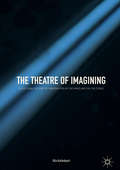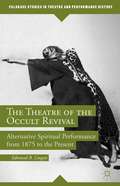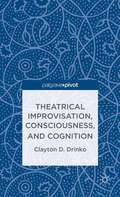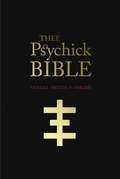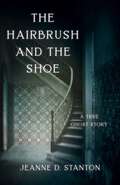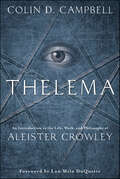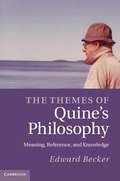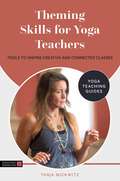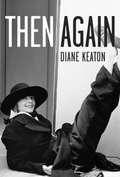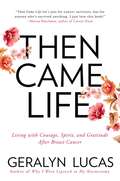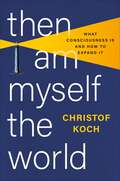- Table View
- List View
The Theatre of Imagining: A Cultural History of Imagination in the Mind and on the Stage
by Ulla KallenbachThis book is the first comprehensive analysis of the fascinating and strikingly diverse history of imagination in the context of theatre and drama. Key questions that the book explores are: How do spectators engage with the drama in performance, and how does the historical context influence the dramaturgy of imagination? In addition to offering a study of the cultural history and theory of imagination in a European context including its philosophical, physiological, cultural and political implications, the book examines the cultural enactment of imagination in the drama text and offers practical strategies for analyzing the aesthetic practice of imagination in drama texts. It covers the early modern to the late modernist period and includes three in-depth case studies: William Shakespeare’s Macbeth (c.1606); Henrik Ibsen’s A Doll’s House (1879); and Eugène Ionesco’s The Killer (1957).
The Theatre Of The Occult Revival
by Edmund B. LinganBased on field research and archival study, this book offers an in-depth exploration of the religious foundations, political and social significance, and aesthetic aspects of the theatre created by several of the most influential leaders of the Occult Revival: Katherine Tingley, Rudolf Steiner, Marie Steiner-von Sivers, Aleister Crowley, Alexander Mathews, and Gerald Gardner. The Occult Revival was an international surge of interest in the supernatural, magic, and Eastern mysticism that thrived in Europe and the United States between the late nineteenth-century and the mid-twentieth-century. By studying the theatre that was developed in affiliation with occult movements, this book shows how theatre contributed to the complication and fragmentation of Western religious culture during the turn-of-the-century Occult Revival and how theatre continues to play a part in the development of occult rituals and beliefs.
Theatrical Improvisation, Consciousness, and Cognition
by Clayton D. DrinkoImprovisation teachers have long known that the human mind could be trained to be effortlessly spontaneous and intuitive. Drinko explores what these improvisation teachers knew about improvisation's effects on consciousness and cognition and compares these theories to current findings in cognitive neuroscience, psychology, and philosophy.
THEE PSYCHICK BIBLE
by Genesis Breyer P-Orridge Jason Louv Carl AbrahamssonThee Temple ov Psychick Youth (TOPY) will be remembered for its crucial influence on youth culture throughout the 1980s, popularizing tattooing, body piercing, "acid house" raves, and other ahead-of-the-curve cultic flirtations and investigations. Its leader was Genesis P-Orridge, co-founder of Psychick TV and Throbbing Gristle, the band that created the industrial music genre.The limited signed cloth edition of Thee Psychick Bible quickly sold out, creating demand for any edition of this 544-page book, which will be available in a handsome smyth-sewn paperback edition with flaps and ribbon. According to author Genesis Breyer P-Orridge, "this is the most profound new manual on practical magick, taking it from its Crowleyan empowerment of the Individual to a next level of realization to evolve our species."
The Hairbrush and the Shoe: A True Ghost Story
by Jeanne D. StantonWhen a workman is pushed and hissed at by something invisible on the stairs of her family’s 150-year-old townhouse, Jeanne Stanton must confront the possibility that a ghost inhabits. She proceeds in the way any former Harvard Business School case writer would: she embarks upon a rigorous search for proof of the ghost’s existence and identity, exploring the literature and lore of ghosts; the practices of mediums, psychics, and “ghost busters;” and the various attempts that have been made over the decades to verify ghostly sounds and sights through scientific methods. After visits to a psychic provide insights but not proof, Stanton enters the equally mysterious realms of physics and neurology, hoping science has answers. Notables encountered during her research efforts include Henry James, Arthur Conan Doyle, Oliver Sacks, and Sigmund Freud, the latter a colleague of her home’s original owner. Wry and witty, Stanton takes time out to laugh at her own futile attempts at ghost detection—spending a sleepless night in an allegedly haunted bedroom, creeping along the edges of rooms in search of cold spots—along the way. Determined to get to the bottom of the ghost business, Stanton wavers between skepticism and belief, searching for definitive evidence—and almost failing to find it. Almost.
Thelema: An Introduction to the Life, Work & Philosophy of Aleister Crowley
by Colin D. CampbellThe Life and Legacy of One of History's Most Fascinating MagiciansThelema is one of the most powerful and influential systems of magick the world has ever known. But to truly understand the philosophy and practice of Thelema, you need to understand its charismatic founder, Aleister Crowley. Thelema reveals this enigmatic figure in all of his provocative and brilliant glory, providing a biography of Crowley and showing how his work evolved to become a paradigm-shifting system of magick. This book also explores the texts and writings that form the basis of Thelema, and it provides step-by-step instructions for practicing the basic rites and rituals of this often-misunderstood tradition.Thelema provides a multifaceted method for spiritual attainment that focuses on manifesting your true will. Discover how Crowley developed his remarkable techniques, and learn how to begin or deepen your own magical practice with elements of Qabalah, Gnosticism, Eastern philosophy, Egyptian spirituality, tarot, and more. Along the way, you'll learn about Crowley's involvement in the Golden Dawn and the O.T.O., his clandestine activities during both world wars, and the nature and influence of his personal relationships.Includes photosForeword by Lon Milo DuQuettePraise:"Colin Campbell's earlier works have shown him to be one of the most thorough and thoughtful Thelemic authors of our era. In Thelema, Campbell brings this same acumen and clarity of expression to the life and work of Aleister Crowley. The book covers a wide range of territory—historical, theoretical, and practical—and will be a useful resource for beginners and more advanced students alike."—David Shoemaker, author of Living Thelema
The Themes of Quine's Philosophy
by Edward BeckerWillard Van Orman Quine's work revolutionized the fields of epistemology, semantics and ontology. At the heart of his philosophy are several interconnected doctrines: his rejection of conventionalism and of the linguistic doctrine of logical and mathematical truth, his rejection of the analytic/synthetic distinction, his thesis of the indeterminacy of translation and his thesis of the inscrutability of reference. In this book Edward Becker sets out to interpret and explain these doctrines. He offers detailed analyses of the relevant texts, discusses Quine's views on meaning, reference and knowledge, and shows how Quine's views developed over the years. He also proposes a new version of the linguistic doctrine of logical truth, and a new way of rehabilitating analyticity. His rich exploration of Quine's thought will interest all those seeking to understand and evaluate the work of one of the most important philosophers of the second half of the twentieth century.
Theming Skills for Yoga Teachers: Tools to Inspire Creative and Connected Classes (Yoga Teaching Guides)
by Tanja MickwitzConsidering yoga philosophy, mythology, poses, and nature, Theming Skills for Yoga Teachers provides guidance in how to skilfully theme yoga classes with greater depth and give students meaningful ways to integrate yoga into their lives beyond the mat. The book encourages autonomy of interpretation whilst also providing questions and exercises at the end of each chapter to help inspire ideas and form a synergy of practical application and creativity. Essential for both yoga teachers and trainees, this book allows them to create more meaningful yoga sessions and hone their teaching ability to provide a more memorable and holistic learning experience.
Then Again
by Diane Keaton"Mom loved adages, quotes, slogans. There were always little reminders pasted on the kitchen wall. For example, the word THINK. I found THINK thumbtacked on a bulletin board in her darkroom. I saw it Scotch-taped on a pencil box she'd collaged. I even found a pamphlet titled THINK on her bedside table. Mom liked to THINK." So begins Diane Keaton's unforgettable memoir about her mother and herself. In it you will meet the woman known to tens of millions as Annie Hall, but you will also meet, and fall in love with, her mother, the loving, complicated, always-thinking Dorothy Hall. To write about herself, Diane realized she had to write about her mother, too, and how their bond came to define both their lives. In a remarkable act of creation, Diane not only reveals herself to us, she also lets us meet in intimate detail her mother. Over the course of her life, Dorothy kept eighty-five journals--literally thousands of pages--in which she wrote about her marriage, her children, and, most probingly, herself. Dorothy also recorded memorable stories about Diane's grandparents. Diane has sorted through these pages to paint an unflinching portrait of her mother--a woman restless with intellectual and creative energy, struggling to find an outlet for her talents--as well as her entire family, recounting a story that spans four generations and nearly a hundred years. More than the autobiography of a legendary actress, Then Again is a book about a very American family with very American dreams. Diane will remind you of yourself, and her bonds with her family will remind you of your own relationships with those you love the most.
Then Came Life
by Geralyn LucasThe author of Why I Wore Lipstick to My Mastectomy dares all women who have had a stumble in life to harness their fighting spirit and stand back up with courage and optimism. One mastectomy, two C-sections, three pant's sizes, and lots of red lipstick later, Geralyn Lucas is dealing with the same issues as other women her age. Her miracle babies have grown into a typical tween with a fierce eye-roll for her mom's failings and a tornado of a little boy who won't play by his preschool's rules. Her storybook romance with her husband has spiraled into couples therapy and her perfect-if-demanding corporate job as a TV producer has abandoned her for L.A. When she looks in the mirror at her hard-won wrinkles, all she wants is . . . Botox. Celebrating her sweet sixteen cancerversary she's thankful for her second chance and ready to be daring--but can she survive life's new ups and downs with the same courage she's always had? With an infectiously hilarious voice and a true sense of empowerment, Geralyn harnesses her fighting spirit to live life loudly and lustily, and to grab on to all the moments that might never have happened. Knowing she can only pedal forward, she mines every day for boldness, joy, and gratitude, and eventually falls in love with life again. Then Came Life is not just for cancer survivors; it's for life survivors--a call to rediscover the resilience and optimism it takes to reinvent yourself at any age.
Then I Am Myself the World: What Consciousness Is and How to Expand It
by Christof Koch"Deeply personal and infinitely digestible, Then I Am Myself the World is a remarkable must-read for anyone interested in knowing their mind.&”―Judson Brewer MD, PhD, New York Times–bestselling author of Unwinding Anxiety The world&’s leading investigator of consciousness argues that by understanding what consciousness does—cause change in the world—we can understand its origins and its future In Then I Am Myself the World, Christof Koch explores the only thing we directly experience: consciousness. At the book&’s heart is integrated-information theory, the idea that the essence of consciousness is the ability to exert causal power over itself, to be an agent of change. Koch investigates the physical origins of consciousness in the brain and how this knowledge can be used to measure consciousness in natural and artificial systems. Enabled by such tools, Koch reveals when and where consciousness exists, and uses that knowledge to confront major social and scientific questions: When does a fetus first become self-aware? Can psychedelic and mystical experiences transform lives? What happens to consciousness in near-death experiences? Why will generative AI ultimately be able to do the very thing we can do, yet never feel any of it? And do our experiences reveal a single, objective reality? This is an essential book for anyone who seeks to understand ourselves and the future we are creating.
Thendral: Vol 10, Issue 10, September, 2010
by MadhurabharathiThis issue features interview of Dr.Era.Nagasamy, Articles on famous writers of 50s Late Devan and Kothamangalam Subbu, Mouthwatering Recipe of Paruppu Urundai Morkuzhambu, Counseling Column of Anbulla Snehitiye, Three short stories, Jokes etc.
Thendral: Vol 10, Issue 11, October 2010
by MadhurabharathiThis issue features Interview of Anuthama(novelist), Anu Natarajan, Kamala Haris and Thamarai(Poet), a nostalgia on Tamil Tinsel world Emperor of yester years M.K.T. Bhagavathar, Recipes of Soya Bean Kurma, Dosa and Curry, two short stories, “Kanavu Veedu” and “Sangeetha Gnaanam”, Children’s fiction, “Pesum Kili” and regular features of Anbulla Snehitiye, Kathiravani Kelungal, Thendral Pesukirathu, Nalam Vaazha, and jokes.
Thendral: Vol 10, Issue 12, November 2010
by MadhurabharathiThe November issue features interviews of Deepa Ramanujam, Artist Gopulu, nostalgia on Tamil Scholar Dr.Va.Suba. Manickanar, Three short stories, Children’fiction “Kadalil Kidaitha Puthayal”, an article on Thanjai Big Temple and Bala Sahitya Puraskar awardee M. Kamalavelan and other regular features such as Recipes (with Horse grain-Kuruma, Idly and Idly powder), Nalam Vazha, Anbulla Snehitiye, Travelogue: Nadai Sutrula at Kodaikanal, Thendral Pesukirathu, Kathiravanai Kelungal, and Jokes.
Thendral: Vol 11, Issue 02, January 2011
by MadhurabharathiThis issue contains Interviews of G. Asokan and Dr. Balaji Sampath, an article on Pandit Gopala Iyer and Muthu Srinivasan, nostalgia on Pope John Paul II, Four Short Stories, a spiritual page on Shirdi Sai Baba, Biography of eminent Children’s writer ‘Vaandumama’, mouth watering jackfruit recipes, besides the regular features of Anbulla Snehitiye, Nalam Vaazha, Kathiravanai Kelungal, Jokes, Ilanthendral, etc.
Thendral: Vol 11, Issue 03, February 2011
by MadhurabharathiThe current issue features Interviews of Carnatic vocalists Bombay Sisters (C.Saroja and C.Lalitha), & Comedian Dhaya Lakshminarayanan, Recipes of Rava Rotis, Biography of the writer, publisher, journalist and orator 'Somale', an artile on 'Tirunelveli Nellaiappar Temple', Short Story (Veettil Oruvar), Nostalgia (Travelogue) - 'Ayyanar Statue in Haryana', Health (Ten Commandments for Ten Years), A write-up on writer Gopikrishnan and his short story (Izhantha Yogam) plus usual features of Anbulla Snehitiye, Kathiravanai Kelungal, Jokes, and Ilanthendral.
Thendral: Vol 11, Issue 04, March 2011
by MadhurabharathiThe current issue features interviews of Dr. Padmini Sharma and novelist Indira soundararajan, Biography of a famous woman novelist of yester years Vai.Mu. Kothainayaki, a spiritual article on Lord Saneeswarar of Thirunallaru, a short story (Gnanakkoothan), nostalgia, a health page on "Bone marrow Transplantation" for Leukemia, a write up on writer Uma Maheswari followed by one of her best short stories, Recipe section containing sambar powder, rasam powder etc. plus other usual features of Anbulla Snehitiye, Kathiravani Kelungal, Jokes, Sirappu Paarvai, Ilanthendral, etc.
Thendral: Vol 11, Issue 05, April 2011
by MadhurabharathiThe current issue features Interviews of Krishna, a Director of Tamil Tinsel World; Narasaiah, Recipes of Rice kichu; vada pav, Biography of Tamil film superstar of '40s- 50s-P.U.Chinnappa, an artile on Tiruvidanthai Nityakalyana Perumal, Three Short Stories, A conversation with Devi Narayani Amma of Vellore Golden Temple, Health (Araiappukkatti), A write-up on writer Stella Bruce and his short story (Enathu Maharaniyin Ninaivaga) plus usual features of Anbulla Snehitiye, Kathiravanai Kelungal, Jokes, and Ilanthendral.
Thendral: Vol 11, Issue 06, May 2011
by MadhurabharathiThe current issue features Interviews of Saranathan and Narasaiah, a special article on "Sri Sathya Sai Baba", a tribute to Tamil novelist Ra.Su. Nallaperumal, Three Short Stories, an article on writer "Keeranoor Jagir Raja" and his short story titled "Budhi Begum Theru Irandavathu Sandhu", a Biography of Tamil Scholar A. Sa. Gnanasambhandhan, Nutritious recipes of Puzhungal Arisi roti (Boiled rice roti) and Dates Halwa, A health page on "The two sides of Contraceptive Pills" a Spiritual round up on Singavaram Sri Renganathar Alayam, plus other usual features of Thendral Pesukirathu, Anbulla Snehitiye, Kathiravanai Kelungal, Jokes, Ilanthendral, etc.
Thendral: Vol 11, Issue 07, June 2011
by MadhurabharathiThis issue features an interview with Ishukrishna of the tinsel world, a biography of Tamil Scholar Kaa. Appadurai, The achieving story of Animation experts Ashwin and Ashok, a religious article on the Hindu Temple of South India-‘Mannargudi Rajagopalaswamy’, Five short stories, a short novel (Sila MatrangaL), an article on the mystery novelist of yester years Vaduvoor K. Duraisamy Iyengar with an extract from his novel “Mangai Madavannam”, a health article Endometriosis in Nalam Vaazha, Kondakkadalai Kaara Bonda and Kondakkadalai Jamoon in Maya Bazaar plus usual features of Thendral Pesukirathu, Anbulla Snehitiye, Kavithaippandhal, Podhu, Kathiravanai KeLungaL, Jokes and Ilanthendral.
Thendral: Vol 11, Issue 09, August 2011
by MadhurabharathiIn addition to usual and popular features of Anbulla Snehitiye, Ilanthendral, Nalam Vaazha and Jokes, this issue contains three short stories; a short novel; interviews with veteran orator, scholar and actor Ku. Gnanasambandhan (some of his jokes also separately featured) and Bharathanatyam exponent Sudha Chandrasekhar; mouthwatering recipes of Mango Soup, Mango Dosa and Mango Lassi; nostalgia on veteran actor-singer of tinsel world of yesteryears Kothamangalam Seenu; a religious article on Mupperum Deviyar Temple; health; tribute, etc.
Thendral: Vol 11, Issue 12, November 2011
by MadhurabharathiThis issue features Interview with journalist Nimmi Raghunathan and Harikathai Suchithra; Recipes of Kadai Baby Corn and a side dish for chappathi; a biography of Abdul Gafoor, a notable contributor to children’s literature; a tribute to Steve Jobs; a religious article on Tiruthani Murugan Temple; a poem; a short story; a short novel; an article on writer N.C.Mohandas and excerpts from one of his short stories, plus usual features of Anbulla Snehitiye, Nalam Vaazha, Ilamthendral, Surya Thupparigiraar, Thendral Pesukirathu, etc.
Thendral: Vol 12, Issue 01, December 2011
by MadhurabharathiThis issue features Interview with contemporary writer of Tamil Literature S. Ramakrishnan; a biography of Tamil Writer Karthika Rajkumar and one of his short stories ‘Sirahatra ParavaigaL’; 7th part of the short novel serial ‘Sila MaatrangaL’; Three prize-winning short stories; Recipes; Nalam vaazha plus usual features such as Thendral Pesukirathu, Anbulla Snehitiye; Ilanthendral, etc.
Thendral: Vol 12, Issue 02, January 2012
by MadhurabharathiThis issue features the second and final part of interview with popular Tamil writer S. Ramakrishnan; a biography of Tamil novelist Jagasirpiyan, and one of his short stories “Narikkurathi”; a nostalgia on Dr. Ma. Rajamanikkanar, a Tamil scholar; a religious article on Mayuranathar Temple of Mayiladuthurai; Tips to stop smoking in ‘Nalam Vazha’; variety rice recipes in ‘Maya Bazaar’; Three prize-winning short stories; Part 8 of short novel ‘Sila Matrangal’ plus usual features of Thendral Pesikirathu, Anbulla Snehitiye, Jokes, Poems, Puzzle, Ilamthendral, etc.
Thendral: Vol 12, Issue 03, February 2012
by MadhurabharathiThis issue features Interviews with Arun, founder of Advantage Testing and Isaikkavi Ramanan ; Biography of Doyen of Tamil Drama Nawab Rajamanickam Pillai; two recipes in Maya Bazaar; an article on Gaya; tributes to Artist G.K. Moorthy and 'Queen of Nadaswaram' Ponnuththaayee; an introduction of Tamil writer G. Murugan with a presentation of one of his short stories; three short stories; Part 9 of short novel ‘Sila Matrangal’ plus usual features of Thendral Pesikirathu, Anbulla Snehitiye, Jokes, Puzzle, Ilamthendral, Nalam Vaazha, etc..
